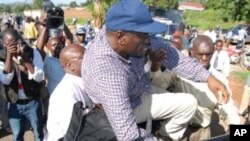In Uganda, the stage was set Thursday for a possible confrontation between police and opposition leader Kizza Besigye and his supporters.
Besigye vowed to stage another "walk-to-work" to highlight what he says is the high cost of transportation in Uganda.
The police say publicizing the desire to walk to work amounts to a procession that will disrupt traffic and business.
Kirunda Kivejinja, Uganda’s Minister for Internal Affairs in charge of police, says there are laws governing processions.
‘Within our own constitution, which guarantees the freedom of everybody, it also says that, in exercising your freedom, make sure that you don’t disturb the freedom of others. Within our own constitution, it is the police that are responsible for keeping law and order. So, what we are saying is, if anybody wants to demonstrate, let him inform the police and be able to tell us who are the people you are going to demonstrate with, what route they want to take, what their destination is so that we can prepare security all along,” he says.
Besigye says he and the other opposition leaders have every right, under Uganda’s constitution, to walk to work without intimidation.
Kivejinja says, while it is true that most people walk in Africa, walking as a form protest is another issue.
“In Africa, the majority of the people are walking. So, walking is not a big issue. They can walk if they want to walk. But, when you walk for a purpose and you have announced that I am going to do this to challenge established order, that’s [a] different matter,” Kivejinja says.
Besigye admits that problems such as the high cost of fuel and food are not unique to Uganda. But, he says the government of President Yoweri Museveni should have put in place contingency plans to deal with these unforeseen crises.
Kivejinja says Besigye has no mandate to claim to be speaking for the people of Uganda because he had the chance during Uganda’s recent election to bring about an alternative government, but failed to win the election.
“He had a chance as an alternative government to put those policies he’s talking about in place, but he prevented himself. Where does he get that mandate? And there are many ways to bring about that change. Will the walking be able to resolve that issue? He has members in parliament. Why do you leave the channels to solve the problem and you go into others which will bring about antagonism?” Kivejinja says.




